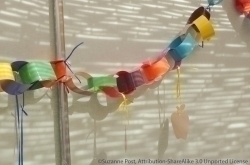There is no other holiday on the Jewish or Gregorian calendar that combines child-like adventurism with semi-pro carpentry, alongside radical hospitality all shaded by an emotional imperative. Just as the weather gets colder and the skies begin to get darker earlier, this holiday, deep in symbolism around the preciousness of life, comes to push pause on our lives for eight days.
If you boil it down, Sukkot is a celebration of a few basic human truths, including “impermanence, change, and faith.” Sukkot is the quintessential holiday for rejoicing. How is this expressed? Through building and then dwelling inside flimsy, elaborate outside forts. In these sukkahs, which are completely and deliberately exposed to the elements, we share as many meals as possible and even sleep in them. As Rabbi Pesach Stadlin once said, “On Sukkot we are commanded to sit in huts and be happy!” That’s basically the point of it. The tradition actually commands us to be happy and share that happiness with guests.
There are so many things I love about Sukkot. I love it as a religious holiday. The prayer is highly celebratory as if to put us in the right frame of mind for entering into the sukkah. But religious people do not have a monopoly on this holiday. Done in the right contexts, Sukkot can become a song-filled jam fest and anyone can participate. Song, however, is not the only way joy can be expressed. Sharing food, telling stories, making art to decorate the sukkah – whatever moves the particular sukkah dwellers to fulfil the commandment to be joyous – it counts. For some it is more quiet and contemplative. For others it is a communal feast. At its core Sukkot is a deep acknowledgement of the gift of life. And yet, the holiday is celebrated outside, often in the cold, sometimes damp conditions. I take this to symbolize a joy that is based in reality. The message I hear is that we don’t need to escape our reality to find joy and meaning. We merely need to slow down, spend time huddled together and notice how lucky we truly are to be alive.
By Rabbi Ezra Weinberg, Youth & Family Department
Upcoming Sukkot Programs at the Y
- Sunday, October 16. PJ Library Cooks and Creates, and Bubbie’s Kitchen: Sukkot Family Celebration. Open to all families.
- Monday, October 17. Be Me: After School Program: Soirée in the Sukkah. Open to all Be Me families.
- Thursday, October 20. Y Beginnings Parenting Center: New Moms Support Group. Open to all moms and babies.
- Thursday, October 20. Center for Adults Living Well at the Y: Coffee Hour. Open to all CALW members.
- Friday, October 21. Y Beginnings Parenting Center: Ukulele Shabbat. Open to all parents and caregivers with children three and under.


